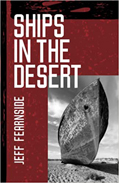
 |
Educator and creative writer Fearnside explores his years as a Peace Corps volunteer in Kazakhstan and Kyrgyzstan, also chronicling his travels in the Muslim regions of Asia along the historic Silk Road. His essays are packed with remembrances, with an emphasis on the manmade environmental crisis of the Aral Sea, once the fourth largest inland sea in the world and later, one of the worst environmental disasters of the past century as it dried up to a fraction of its former size. Fearnside also contemplates the ramifications for similar water catastrophes now emerging around the world, including the unintentional creation of the Salton Sea in southern California a little more than a century ago and the current degradation of the body of water as it succumbs to climate change and drought.
The author writes: “Getting to the [Aral] sea was never easy even before it began shrinking. It lies in the heart of the Eurasian landmass—south of Russia, east of the Caspian Sea, and north and west of the towering mountain ranges that separate Central Asia from China and the Indian subcontinent—surrounded by inhospitable deserts and lonely steppes… All along the railway, salt covered the sandy earth for scores of kilometers. More troubling, I knew it wasn’t just salt but also a dry cocktail of chemicals—fertilizers, pesticides, herbicides, and defoliants—that for decades had washed from farms into the watershed.”
Fearnside writes lyrically about his initial experiences with his host family in Kazakhstan, sharing his observations of the people, politics, and landscapes of the region in seven themed essays that are at once informative, educational, and entertaining. His talent as a short story writer is apparent in the lucid, award-winning nonfiction treatment of race, class, religion, and political and historical relevance of the region, coupled with the outstanding ecological problems brought by Soviet attempts at growing cotton (an important but water-intensive crop) and the subsequent problems caused by drought. Fearnside’s relatively brief but profound journeys and the personal learning experiences he shares enhance the budding cultural exchange between East and West and help to expand Western knowledge of an often-misunderstood region.
This small but important volume is a testament to the importance of sharing information worldwide and a nod to the lofty goal of cooperative, international work to reverse the manmade contributions to climate chaos and environmental degradation. The author also stresses the importance of universal religious tolerance and maintaining an ongoing dialogue between cultures. Fearnside’s background of working and living in Asia gives weight to this work. His experiences clearly emphasize that mankind’s environmental issues are interwoven with personal and cultural stories and influences. The author asks and answers many questions in his essays but doesn’t pretend to be a definitive source for all discourse about the region. Fearnside supports his essays with a valuable nonfiction bibliography of books, articles, and websites in the book’s back matter, more than enough material to propel this small book into the ongoing conversation about adjustments humans must make in order to recreate a healthy planetary refuge for many generations to come.
The 2023 Eric Hoffer Book Award Culture Category Winner
RECOMMENDED by the US Review